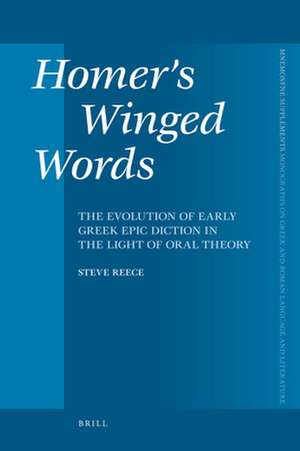Homer's Winged Words: The Evolution of Early Greek Epic Diction in the Light of Oral Theory: Mnemosyne, Supplements, cartea 313
Autor Steve Reeceen Limba Engleză Hardback – 19 mai 2009
Din seria Mnemosyne, Supplements
-
 Preț: 370.60 lei
Preț: 370.60 lei - 18%
 Preț: 735.03 lei
Preț: 735.03 lei - 18%
 Preț: 701.23 lei
Preț: 701.23 lei -
 Preț: 268.13 lei
Preț: 268.13 lei -
 Preț: 90.66 lei
Preț: 90.66 lei - 18%
 Preț: 584.00 lei
Preț: 584.00 lei -
 Preț: 169.79 lei
Preț: 169.79 lei -
 Preț: 216.33 lei
Preț: 216.33 lei - 18%
 Preț: 585.24 lei
Preț: 585.24 lei - 18%
 Preț: 581.90 lei
Preț: 581.90 lei - 18%
 Preț: 729.54 lei
Preț: 729.54 lei - 18%
 Preț: 657.49 lei
Preț: 657.49 lei - 15%
 Preț: 412.39 lei
Preț: 412.39 lei - 18%
 Preț: 708.10 lei
Preț: 708.10 lei - 18%
 Preț: 731.10 lei
Preț: 731.10 lei -
 Preț: 270.75 lei
Preț: 270.75 lei - 18%
 Preț: 730.72 lei
Preț: 730.72 lei - 18%
 Preț: 733.05 lei
Preț: 733.05 lei - 18%
 Preț: 586.33 lei
Preț: 586.33 lei - 18%
 Preț: 731.87 lei
Preț: 731.87 lei - 18%
 Preț: 586.17 lei
Preț: 586.17 lei - 18%
 Preț: 1544.97 lei
Preț: 1544.97 lei - 18%
 Preț: 731.64 lei
Preț: 731.64 lei - 18%
 Preț: 732.02 lei
Preț: 732.02 lei - 18%
 Preț: 972.52 lei
Preț: 972.52 lei - 18%
 Preț: 585.94 lei
Preț: 585.94 lei -
 Preț: 380.60 lei
Preț: 380.60 lei - 18%
 Preț: 718.29 lei
Preț: 718.29 lei - 18%
 Preț: 732.20 lei
Preț: 732.20 lei - 18%
 Preț: 586.25 lei
Preț: 586.25 lei - 18%
 Preț: 731.58 lei
Preț: 731.58 lei - 18%
 Preț: 1257.66 lei
Preț: 1257.66 lei - 18%
 Preț: 970.26 lei
Preț: 970.26 lei - 18%
 Preț: 557.29 lei
Preț: 557.29 lei - 18%
 Preț: 847.30 lei
Preț: 847.30 lei - 18%
 Preț: 732.43 lei
Preț: 732.43 lei - 18%
 Preț: 731.79 lei
Preț: 731.79 lei -
 Preț: 355.16 lei
Preț: 355.16 lei - 18%
 Preț: 588.13 lei
Preț: 588.13 lei - 18%
 Preț: 1211.54 lei
Preț: 1211.54 lei - 18%
 Preț: 586.10 lei
Preț: 586.10 lei - 18%
 Preț: 732.82 lei
Preț: 732.82 lei - 18%
 Preț: 732.34 lei
Preț: 732.34 lei - 18%
 Preț: 1484.10 lei
Preț: 1484.10 lei - 18%
 Preț: 731.58 lei
Preț: 731.58 lei - 18%
 Preț: 730.62 lei
Preț: 730.62 lei - 18%
 Preț: 732.02 lei
Preț: 732.02 lei - 18%
 Preț: 970.19 lei
Preț: 970.19 lei -
 Preț: 114.82 lei
Preț: 114.82 lei - 18%
 Preț: 731.87 lei
Preț: 731.87 lei
Preț: 1165.25 lei
Preț vechi: 1421.03 lei
-18% Nou
Puncte Express: 1748
Preț estimativ în valută:
222.96€ • 233.42$ • 184.49£
222.96€ • 233.42$ • 184.49£
Carte indisponibilă temporar
Doresc să fiu notificat când acest titlu va fi disponibil:
Se trimite...
Preluare comenzi: 021 569.72.76
Specificații
ISBN-13: 9789004174412
ISBN-10: 9004174419
Pagini: 413
Dimensiuni: 160 x 240 x 28 mm
Greutate: 0.82 kg
Editura: Brill
Colecția Brill
Seria Mnemosyne, Supplements
ISBN-10: 9004174419
Pagini: 413
Dimensiuni: 160 x 240 x 28 mm
Greutate: 0.82 kg
Editura: Brill
Colecția Brill
Seria Mnemosyne, Supplements
Notă biografică
Steve Reece, Ph.D. (1990) in Classics, University of California, Los Angeles, is Professor of Classics at Saint Olaf College in Northfield, Minnesota. He has published widely on Homeric studies, New Testament studies, comparative oral traditions, historical linguistics, and pedagogy.
Recenzii
"There is indeed no comparable work. Reece's book will be of interest to those interested in linguistic change and the history of Greek, prosody (in the broader sense encompassing e.g. rhythm, intonation, and syllabification, and not just metrics), and of course the Homeric Kunstsprache and the oral-formulaic theory of performance and composition. We are indebted to Reece for undertaking such a comprehensive investigation of the topic (the book is just over four-hundred pages)." D.M. Goldstein, BMCR 2010.03.03
"While the book can be read piecemeal, Reece builds a solid and cumulative case for his thesis that poetry composed
and experienced within an oral tradition is especially liable to certain kinds of verbal innovation, which in turn
explains the origins of some of the most notoriously obscure Homeric expressions."
Jenny Strauss Clay, University of Virginia.
Religious Studies Review, vol. 37 nr. 2 2011
"While the book can be read piecemeal, Reece builds a solid and cumulative case for his thesis that poetry composed
and experienced within an oral tradition is especially liable to certain kinds of verbal innovation, which in turn
explains the origins of some of the most notoriously obscure Homeric expressions."
Jenny Strauss Clay, University of Virginia.
Religious Studies Review, vol. 37 nr. 2 2011
